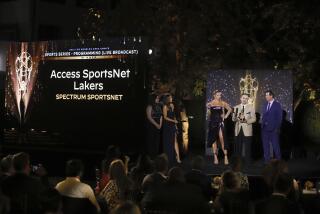FCC’s Rules Cut TV Offerings of 2 Satellite Firms
WASHINGTON — EchoStar Communications Corp. and Hughes Electronics Corp.’s DirecTV must black out some sports and entertainment shows under new satellite-television rules approved by the Federal Communications Commission.
Congress last year let satellite companies add local TV stations on the condition that the FCC would put rules in place protecting sports and local programming rights.
EchoStar and DirecTV, the two largest companies with more than 13 million customers, started offering some local TV channels last December. EchoStar warned that the restrictions sought by sports leagues, local stations and the cable industry could force the company to drop five popular “superstations” from its system.
The rules aim “to place satellite carriers on an equal footing with cable operators,” the commission order said. “We are cognizant also of the important protection that the exclusivity rules provide to broadcasters and copyright holders.”
The rules, which take effect at the end of November, force satellite companies to black out syndicated programs or sports events for viewers in communities where local broadcasters have rights to the programming or where the sports event is restricted.
The satellite companies have four months to phase out syndicated shows and 60 days to eliminate the sports programming.
The shares of Littleton, Colo.-based EchoStar fell 19 cents to $47 on Nasdaq. Hughes, based in El Segundo, closed at $32.50, up $1 on the New York Stock Exchange.
EchoStar, which has 1 million customers buying signals for the superstations, told the FCC that new rules might force the company to drop KTLA-Los Angeles, KWGN-Denver, WPIX and WWOR-New York and WSBK-Boston from the system. DirecTV, owned by General Motors Corp.’s Hughes, would face minimal disruption because it offers only one superstation, WGN from Chicago.
More to Read
The biggest entertainment stories
Get our big stories about Hollywood, film, television, music, arts, culture and more right in your inbox as soon as they publish.
You may occasionally receive promotional content from the Los Angeles Times.










